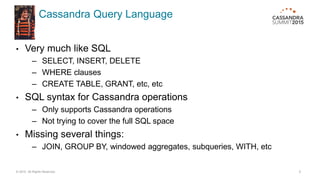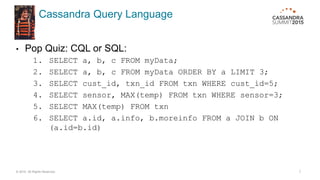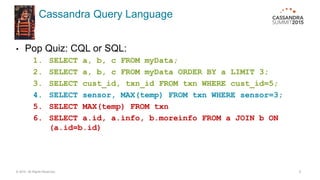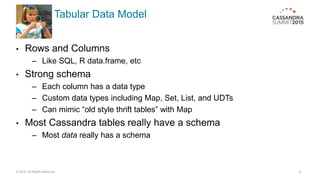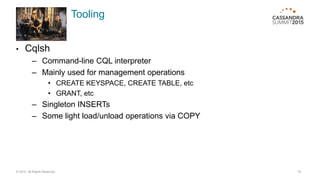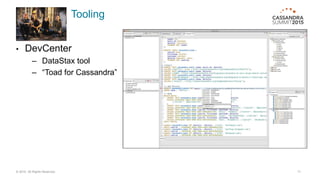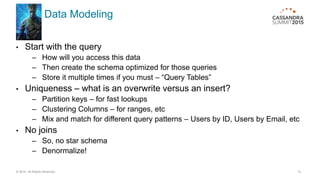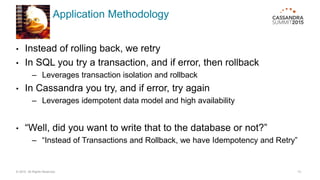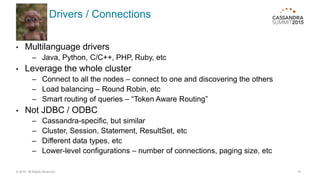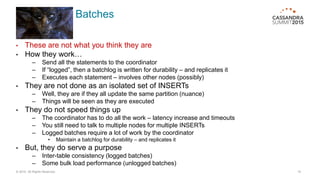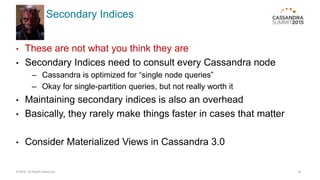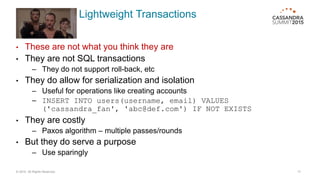Cassandra: An Alien Technology That's not so Alien
- 1. Cassandra: An Alien Technology ThatŌĆÖs not so Alien
- 2. Who am I? ŌĆó Brian Hess ŌĆō Sr. Product Manger for Analytics ŌĆó Math and CS background ŌĆō Distributed Systems ŌĆō Algorithms ŌĆó Government data mining research ŌĆó Data warehousing (Netezza) ŌĆō SQL and data mining and UDF fun ŌĆó Joined Datastax 1.5 years ago ŌĆō New to NoSQL and Cassandra ┬® 2015. All Rights Reserved. 2
- 3. ┬® 2015. All Rights Reserved. 3
- 4. ┬® 2015. All Rights Reserved. 4
- 5. Agenda The Good ŌĆó Query Language ŌĆó Tooling ŌĆó Conceptual Data Model The Different ŌĆó Application Methodology ŌĆó Connections/Drivers ŌĆó Data Modeling The Dangerous ŌĆó Batches ŌĆó Secondary Indices ŌĆó Lightweight Transactions ┬® 2015. All Rights Reserved. 5
- 6. Cassandra Query Language ŌĆó Very much like SQL ŌĆō SELECT, INSERT, DELETE ŌĆō WHERE clauses ŌĆō CREATE TABLE, GRANT, etc, etc ŌĆó SQL syntax for Cassandra operations ŌĆō Only supports Cassandra operations ŌĆō Not trying to cover the full SQL space ŌĆó Missing several things: ŌĆō JOIN, GROUP BY, windowed aggregates, subqueries, WITH, etc ┬® 2015. All Rights Reserved. 6
- 7. Cassandra Query Language ŌĆó Pop Quiz: CQL or SQL: 1. SELECT a, b, c FROM myData; 2. SELECT a, b, c FROM myData ORDER BY a LIMIT 3; 3. SELECT cust_id, txn_id FROM txn WHERE cust_id=5; 4. SELECT sensor, MAX(temp) FROM txn WHERE sensor=3; 5. SELECT MAX(temp) FROM txn 6. SELECT a.id, a.info, b.moreinfo FROM a JOIN b ON (a.id=b.id) ┬® 2015. All Rights Reserved. 7
- 8. Cassandra Query Language ŌĆó Pop Quiz: CQL or SQL: 1. SELECT a, b, c FROM myData; 2. SELECT a, b, c FROM myData ORDER BY a LIMIT 3; 3. SELECT cust_id, txn_id FROM txn WHERE cust_id=5; 4. SELECT sensor, MAX(temp) FROM txn WHERE sensor=3; 5. SELECT MAX(temp) FROM txn 6. SELECT a.id, a.info, b.moreinfo FROM a JOIN b ON (a.id=b.id) ┬® 2015. All Rights Reserved. 8
- 9. Tabular Data Model ŌĆó Rows and Columns ŌĆō Like SQL, R data.frame, etc ŌĆó Strong schema ŌĆō Each column has a data type ŌĆō Custom data types including Map, Set, List, and UDTs ŌĆō Can mimic ŌĆ£old style thrift tablesŌĆØ with Map ŌĆó Most Cassandra tables really have a schema ŌĆō Most data really has a schema ┬® 2015. All Rights Reserved. 9
- 10. Tooling ŌĆó Cqlsh ŌĆō Command-line CQL interpreter ŌĆō Mainly used for management operations ŌĆó CREATE KEYSPACE, CREATE TABLE, etc ŌĆó GRANT, etc ŌĆō Singleton INSERTs ŌĆō Some light load/unload operations via COPY ┬® 2015. All Rights Reserved. 10
- 11. Tooling ŌĆó DevCenter ŌĆō DataStax tool ŌĆō ŌĆ£Toad for CassandraŌĆØ ┬® 2015. All Rights Reserved. 11
- 12. Data Modeling ŌĆó Start with the query ŌĆō How will you access this data ŌĆō Then create the schema optimized for those queries ŌĆō Store it multiple times if you must ŌĆō ŌĆ£Query TablesŌĆØ ŌĆó Uniqueness ŌĆō what is an overwrite versus an insert? ŌĆō Partition keys ŌĆō for fast lookups ŌĆō Clustering Columns ŌĆō for ranges, etc ŌĆō Mix and match for different query patterns ŌĆō Users by ID, Users by Email, etc ŌĆó No joins ŌĆō So, no star schema ŌĆō Denormalize! ┬® 2015. All Rights Reserved. 12
- 13. Application Methodology ŌĆó Instead of rolling back, we retry ŌĆó In SQL you try a transaction, and if error, then rollback ŌĆō Leverages transaction isolation and rollback ŌĆó In Cassandra you try, and if error, try again ŌĆō Leverages idempotent data model and high availability ŌĆó ŌĆ£Well, did you want to write that to the database or not?ŌĆØ ŌĆō ŌĆ£Instead of Transactions and Rollback, we have Idempotency and RetryŌĆØ ┬® 2015. All Rights Reserved. 13
- 14. Drivers / Connections ŌĆó Multilanguage drivers ŌĆō Java, Python, C/C++, PHP, Ruby, etc ŌĆó Leverage the whole cluster ŌĆō Connect to all the nodes ŌĆō connect to one and discovering the others ŌĆō Load balancing ŌĆō Round Robin, etc ŌĆō Smart routing of queries ŌĆō ŌĆ£Token Aware RoutingŌĆØ ŌĆó Not JDBC / ODBC ŌĆō Cassandra-specific, but similar ŌĆō Cluster, Session, Statement, ResultSet, etc ŌĆō Different data types, etc ŌĆō Lower-level configurations ŌĆō number of connections, paging size, etc ┬® 2015. All Rights Reserved. 14
- 15. Batches ŌĆó These are not what you think they are ŌĆó How they workŌĆ” ŌĆō Send all the statements to the coordinator ŌĆō If ŌĆ£loggedŌĆØ, then a batchlog is written for durability ŌĆō and replicates it ŌĆō Executes each statement ŌĆō involves other nodes (possibly) ŌĆó They are not done as an isolated set of INSERTs ŌĆō Well, they are if they all update the same partition (nuance) ŌĆō Things will be seen as they are executed ŌĆó They do not speed things up ŌĆō The coordinator has to do all the work ŌĆō latency increase and timeouts ŌĆō You still need to talk to multiple nodes for multiple INSERTs ŌĆō Logged batches require a lot of work by the coordinator ŌĆó Maintain a batchlog for durability ŌĆō and replicates it ŌĆó But, they do serve a purpose ŌĆō Inter-table consistency (logged batches) ŌĆō Some bulk load performance (unlogged batches) ┬® 2015. All Rights Reserved. 15
- 16. Secondary Indices ŌĆó These are not what you think they are ŌĆó Secondary Indices need to consult every Cassandra node ŌĆō Cassandra is optimized for ŌĆ£single node queriesŌĆØ ŌĆō Okay for single-partition queries, but not really worth it ŌĆó Maintaining secondary indices is also an overhead ŌĆó Basically, they rarely make things faster in cases that matter ŌĆó Consider Materialized Views in Cassandra 3.0 ┬® 2015. All Rights Reserved. 16
- 17. Lightweight Transactions ŌĆó These are not what you think they are ŌĆó They are not SQL transactions ŌĆō They do not support roll-back, etc ŌĆó They do allow for serialization and isolation ŌĆō Useful for operations like creating accounts ŌĆō INSERT INTO users(username, email) VALUES ('cassandra_fan', 'abc@def.com') IF NOT EXISTS ŌĆó They are costly ŌĆō Paxos algorithm ŌĆō multiple passes/rounds ŌĆó But they do serve a purpose ŌĆō Use sparingly ┬® 2015. All Rights Reserved. 17
- 18. Thank you
- 19. Cassandra? ┬® 2015. All Rights Reserved. 19
- 20. Cassandra! ┬® 2015. All Rights Reserved. 20






